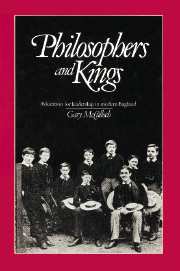2 - An English tradition
Published online by Cambridge University Press: 16 November 2009
Summary
To what extent was education for leadership really an ‘English tradition’? Although it was appropriated, indeed colonised in the nineteenth century and was often to be celebrated as quintessentially English, many aspects of this ideal had of course originated and developed elsewhere. Chivalry had attained its zenith in medieval France, and it was Renaissance Italy that was largely responsible for giving sixteenth-century England its idea of the proper manners and training of a gentleman. The English manifestation of education for leadership was an instance of a tradition being, if not exactly invented, then certainly shaped to suit a particular configuration of social and political interests.
There were many other examples of societies in which a variant of the Platonic vision of leadership exerted potent influence. The common Greek heritage and Renaissance ideal stimulated in the American colonies, just as in England, grammar schools which sought to promote civic character and leadership qualities. In the new Republic educational institutions were often regarded as a means of selecting and educating future leaders, a perception that gave education a central place in politics and society. Thomas Jefferson was especially concerned with the education of the future leaders of the United States, seeking to identify a ‘natural aristocracy’. The galaxy of strong political leaders in eighteenth-century America has been attributed in part to the quality and character of education, with its emphasis on the classics and on history intended to inspire a sense of duty and of civic virtue.
- Type
- Chapter
- Information
- Philosophers and KingsEducation for Leadership in Modern England, pp. 10 - 22Publisher: Cambridge University PressPrint publication year: 1991



